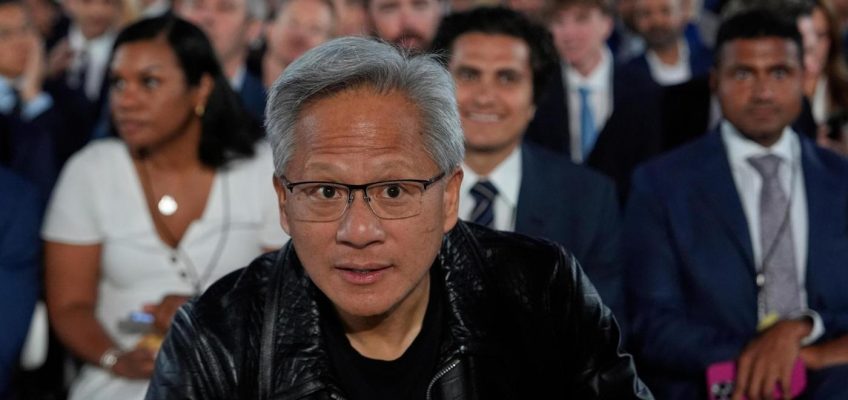By ELAINE KURTENBACH, Associated Press Business Writer
BANGKOK (AP) — Nvidia CEO Jensen Huang said Friday that the company is discussing a potential new computer chip designed for China with the Trump administration.
Huang was asked about a possible “B30A” semiconductor for artificial intelligence data centers for China while on a visit to Taiwan, where he was meeting Nvidia’s key manufacturing partner, Taiwan Semiconductor Manufacturing Corp., the world’s largest chip maker.
Related Articles
Powell signals Fed may cut rates soon even as inflation risks remain
Tokenized stock trading: The huge risks in moving stocks to blockchain
Wall Street rallies and the Dow soars 700 points on hopes for lower interest rates
As AI becomes part of everyday life, it brings a hidden climate cost
Cracker Barrel unveils a new logo as part of wider rebrand efforts, sparking ire among some online
“I’m offering a new product to China for … AI data centers, the follow-on to H20,” Huang said. But he added that “That’s not our decision to make. It’s up to, of course, the United States government. And we’re in dialogue with them, but it’s too soon to know.”
Such chips are graphics processing units, or GPUs, a type of device used to build and update a range of AI systems. But they are less powerful than Nvidia’s top semiconductors today, which cannot be sold to China due to U.S. national security restrictions.
The B30A, based on California-based Nvidia’s specialized Blackwell technology, is reported to operate at about half the speed of Nvidia’s main B300 chips.
Huang praised the the Trump administration for recently approving sales of Nvidia’s H20 chips to China after such business was suspended in April, with the proviso that the company must pay a 15% tax to the U.S. government on those sales. Chip maker Advanced Micro Devices, or AMD, was told to pay the same tax on its sales of its MI380 chips to China.
As part of broader trade talks, Beijing and Washington recently agreed to pull back some non-tariff restrictions. China approved more permits for rare earth magnets to be exported to the U.S., while Washington lifted curbs on chip design software and jet engines. After lobbying by Huang, it also allowed sales of the H20 chips to go through.
Huang did not comment directly on the tax when asked but said Nvidia appreciated being able to sell H20s to China.
He said such sales pose no security risk for the United States. Nvidia is also speaking with Beijing to reassure Chinese authorities that those chips do not pose a “backdoor” security risk, Huang said.
“We have made very clear and put to rest that H20 has no security backdoors. There are no such things. There never has. And so hopefully the response that we’ve given to the Chinese government will be sufficient,” he said.
The Cyberspace Administration of China, the country’s internet watchdog, recently posted a notice on its website referring to alleged “serious security issues” with Nvidia’s computer chips.
It said U.S. experts on AI had said such chips have “mature tracking and location and remote shutdown technologies” and Nvidia had been asked to explain any such risks and provide documentation about the issue.
Huang said Nvidia was surprised by the accusation and was discussing the issue with Beijing.
“As you know, they requested and urged us to secure licenses for the H20s for some time. And I’ve worked quite hard to help them secure the licenses. And so hopefully this will be resolved,” Huang said.
Unconfirmed reports said Chinese authorities were also unhappy over comments by U.S. Commerce Secretary Howard Lutnick suggesting the U.S. was only selling outdated chips to China.
Speaking on CNBC, Lutnick said the U.S. strategy was to keep China reliant on American chip technology.
“We don’t sell them our best stuff,” he said. “Not our second best stuff. Not even our third best, but I think fourth best is where we’ve come out that we’re cool,” he said.
China’s ruling Communist Party has made self-reliance in advanced technology a strategic priority, though it still relies on foreign semiconductor knowhow for much of what it produces.
AP Videojournalist Taijing Wu in Taipei contributed to this report.


Leave a Reply